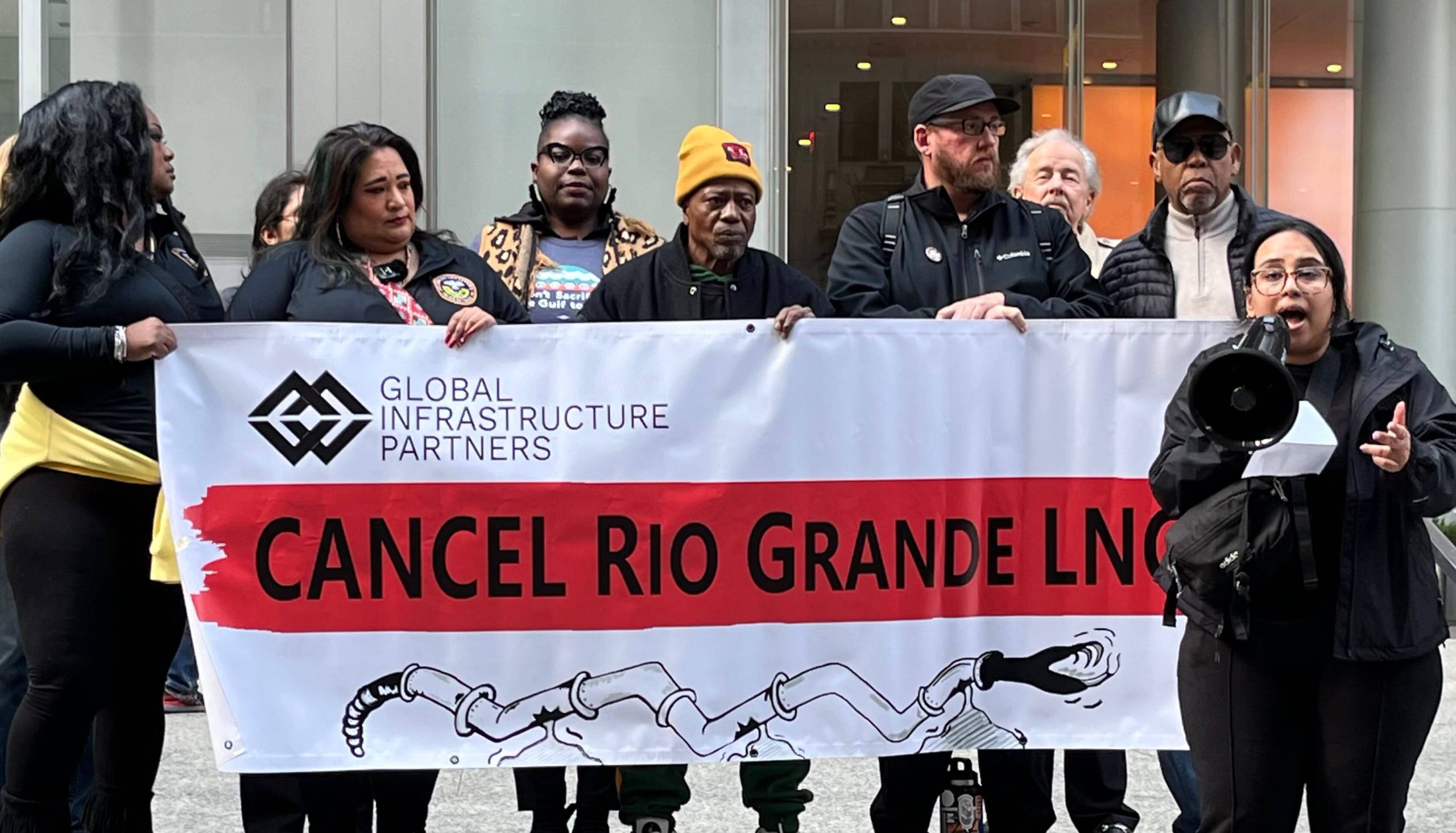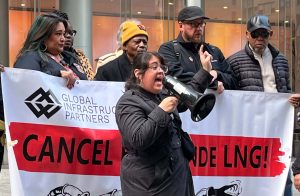
LNG demand letter, samples of wetlands delivered to GIP headquarters
February 27, 2024
South Texas communities deliver demand letter, samples of wetlands to Global Infrastructure Partners headquarters
Community members and activists join on day of action against the financial backers of Rio Grande LNG
Today, community members from South Texas joined together with activists and watchdog groups at the headquarters of private equity firm Global Infrastructure Partners (GIP) to demand an end to GIP’s proposed liquid natural gas project, Rio Grande LNG. The groups delivered a letter signed by over 90 organizations to GIP headquarters urging the firm to end development of the terminal. The groups will provide actual wetland samples from Brownsville, Texas, the site where bulldozing for the terminal has already begun.
Global Infrastructure Partners has a substantial $3.5 billion investment in Rio Grande LNG, making the firm the largest investor with a minimum 46% ownership stake in the project. Because of the opaque nature of its business model, private equity firms like GIP can escape public scrutiny while continuing to drive fossil fuel expansion. Brownsville residents and members of the Carrizo Comecrudo Tribe of Texas will be the first to bear the brunt of the facilities’ environmental hazards, all while leaked methane accelerates global temperature rise.
The action at GIP headquarters culminates after months of campaigning and speaking to GIP’s largest investors. PESP joined community and Tribe members at Washington State Investment Board and Oregon Investment Council meetings to request their support in halting the Rio Grande terminal given the environmental and financial risks. Community members and PESP sought to meet directly with GIP leadership to address concerns around the Rio Grande investment, but the firm was unresponsive.
“We have attempted to meet with GIP leadership for months now and have only been met with silence,” said Abhilasha Bhola, PESP senior campaign coordinator. “Now, all we can do is show up at their doorstep with our demands and show the firm the real impacts of its investment. South Texas does not want to be bulldozed by private equity firms in order to build a costly and dangerous LNG terminal. Rio Grande LNG is risky for South Texas, risky for our climate, and risky for all the GIP investors across the country.”
The Rio Grande LNG terminal is estimated to emit the equivalent emissions of 44 coal power plants every year, about 163 million tons of carbon dioxide equivalent. The terminal would be built on thesacred land of the Carrizo Comecrudo Tribe of Texas yet Rio Grande LNG, regulatory agencies and banks have all failed to consult with the tribe on local impacts. Additionally, the facilities would significantly degrade local fishing, shrimping and natural tourism industries putting communities’ livelihoods at risk.
“Global Infrastructure Partners must halt the Rio Grande LNG because this dangerous gas project will destroy lands that are sacred to our Tribe and release pollution that is damaging to our community’s health,” said Juan Mancias, Chairman of the Carrizo Comecrudo Tribe of Texas. “Much of our sacred land is being bulldozed by Rio Grande LNG’s land-clearing equipment and even more so by fossil fuel colonization such as fracking. As a great grandfather and chairman of the Carrizo Comecrudo Tribe, we are fighting back to protect our remaining sacred lands and access for our Tribe’s future generations. We are calling on Global Infrastructure Partners not to be complicit with this destruction.”

“If built, Rio Grande LNG would destroy our low-income, primarily Latine community’s way of life,” said Bekah Hinojosa from Brownsville, Texas. “Pollution from these mega LNG export terminals would pollute the waterways where shrimp lay their eggs and our people fish to feed their families. For nearly a decade, we have confronted investors, banks, companies, and permitting agencies involved with Global Infrastructure Partners’ Rio Grande LNG and urged them to reject this dangerous gas project. We continue to call on insurance companies and private equity firms to stop backing LNG terminals.”
The day of action against the benefactors of LNG projects concluded with an event at the headquarters of AIG, the company that has provided insurance certificates for LNG terminals. AIG is a major global insurer headquartered in the U.S., offering services in more than 70 countries and jurisdictions. The company was the world’s tenth largest fossil fuel insurer in 2022. AIG collected an estimated $425-675 million in 2022 premiums from fossil fuel companies, and held $24.2 billion in fossil fuel investments. Activists also marched by insurance companies Chubb and Sompo which are insuring the Rio Grande LNG terminal.
